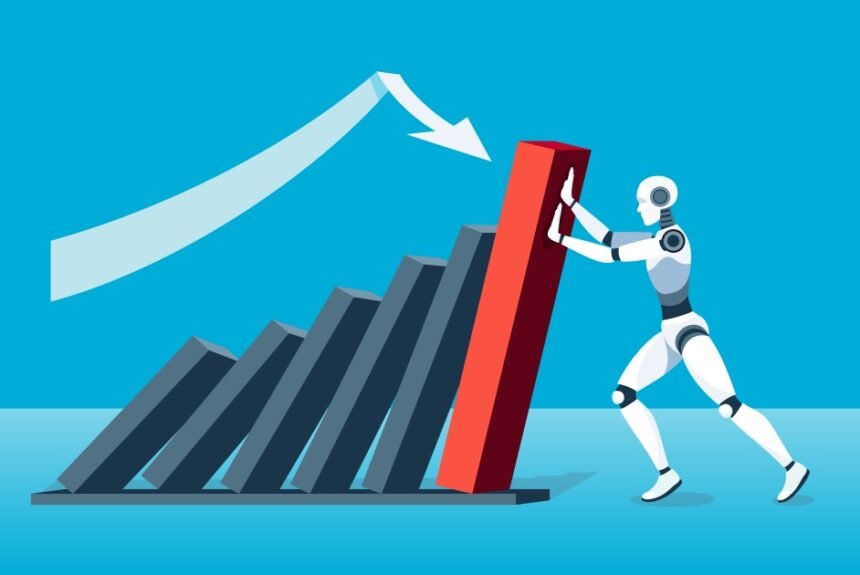Many Americans are growing more hesitant about the use of artificial intelligence technology in K-12 schools. Support for some popular applications of AI has declined from last year, according to the latest PDK poll on American attitudes toward public education.
For parents—a subset of respondents to the survey—student data privacy is a particular concern. Nearly 7 in 10 of parent respondents said they did not support giving AI software access to students’ grades, assessment data, or other personal information.
This matters for AI adoption in schools because public opinion often shapes how new technologies are implemented in the classroom, said Jonathan E. Collins, an assistant professor of political science and education at Teachers College, Columbia University. Although skepticism around AI is not surprising, he said, whether it changes will depend largely on the actions of policymakers, school leaders, and AI companies.
“Every time there is a major technological shift, there is public suspicion before we move forward with implementation and integration,” he said. “The biggest question with AI is how we’re going to put guardrails in place to get the good version of it. You need guardrails to increase the likelihood that more often than not, it helps us in positive ways. That will determine whether we’ll see public opinion for this grow.”
Every negative headline about AI running amok can set back public opinion, Collins said.
This is the 57th annual PDK poll on Americans’ attitudes toward public education. This year’s poll was conducted by the Wason Center for Civic Leadership at Christopher Newport University while previous PDK Polls were conducted by Gallup. The survey, which ran from June 21-30, included a random, nationally representative sample of 1,005 adults.
Attitudes toward AI in education are not solidified
The poll also asked all of the repondents, both parents adults with grown children or no children at all, about potential AI uses in classrooms. Americans especially soured on the idea of teachers using AI to prepare lesson plans, the poll found. Support for that use dropped to 49% this year, down from 62% last year.
The least popular use for AI is allowing students to use the technology to prepare their homework. Thirty-eight percent of respondents supported this use case this year compared with 43% last year. But AI tools continue to evolve on this front.
ChatGPT released a new “study mode” feature over the summer that is designed to coach users through steps to find the answer, instead of simply giving it. OpenAI, the company that created ChatGPT, said that this is a first step toward ensuring that students are learning when they use the app.
Tutoring is still the most widely accepted use of AI in schools, with 60% supporting interactive AI tutoring tools, though that number slipped from 65% last year.
However, many respondents’ feelings on these topics were not strong, said Collins. Large shares of responses fell into the “support” or “oppose” categories versus “strongly” supporting or opposing these cases.
That signals that there’s the potential for people’s attitudes to shift, said Collins. It’s critical, therefore, for education leaders with plans to integrate AI into instruction to be proactive with how they communicate those plans to parents.
“It needs to be, ‘here is our plan for safe AI use in schools, here’s how this is going to benefit our students [and] teachers, this is what we stand to gain,’” he said. “Really get parents to see why we’re moving forward with this. Is there a clear personal benefit to me as a parent by having my kid at this school that is using AI, versus me just finding out that they’re using AI and I don’t know if they’re being safe or protecting kids’ identities and information?”
One area of strong consensus among poll respondents is whether schools should be educating students about technology, such as AI and responsible social media use. Nearly 6 in 10 said it was very important and a quarter said it was somewhat important.
Adults’ opinions could affect equitable access to AI in schools
Despite public skepticism, momentum behind AI in education is growing, with a strong push coming from the uppermost levels of government. President Donald Trump signed an executive order in April that aims to integrate AI across K-12 education with a major focus on training teachers to use AI.
The U.S. Department of Education also announced in July that advancing AI will be a funding priority in upcoming grants.
Meanwhile, education technology companies are investing heavily in AI-powered tools—from AI teacher assistants to adaptive student tutoring tools.
Other polling shows that teachers are rapidly adopting the technology to create worksheets, plan lessons, write student feedback, and respond to emails.
Teachers are among the professionals who are poised to benefit the most from AI, said Collins.
AI is useful for increasing non-labor-based productivity, he said, such as analyzing data, organizing thoughts, or creating images.
“AI isn’t going to help you be a better barber,” he said. “There is a stratification that [we’re] already worried about: AI being great for the people in higher socioeconomic sections of our society.”
Those who don’t use AI in their day-to-day lives might remain more skeptical of the technology, Collins said, and their opinions could affect whether their local schools prioritize or even shy away from integrating AI into classrooms.
“That’s the real concern to me when I see the public opinion divide: is this going to lead to uneven implementation? he said. “Usually when there’s uneven implementation around technology in education, it usually benefits the kids who are coming from wealthier households.”







